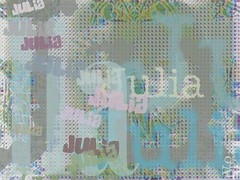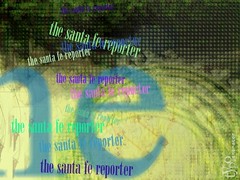The Politics of Culture
On the face it, Santa Fe’s culturally-packed weekend was devoid of politics. At the July 16 press preview for SITE Santa Fe’s biennial (which contrary to Staff Writer Zane Fischer’s column this week I was not dragged to; I wanted to go), Curator Robert Storr made a point, in response to questions, of saying that the exhibit, Disparities & Deformations: Our Grotesque, was not political in nature. And he went on to say, or at least imply, that his political views, whatever they might be, were not relevent to the show.
I wondered, as I wandered through the hallways, about this decision. If a biennial is about, to some extent, capturing the cultural zeitgist, how in 2004 could any show create a dialogue about “Our Grotesque,” without acknowledging the grotesque in our national and international affairs. As a photo critic and I discussed later in the weekend, photos from Iraq over the last few months felt more disconcerting and grotesque than anything we saw on SITE’s walls.
The weekend continued to unfold. That evening, 1,000 people packed Sweeney Center for a live no-rules fight, called Explosion, that featured fightters from The Santa Fe Brazilian Jui Jitsu Academy. On the one hand, it’s always exciting, in Santa Fe, to see a large enthusiastic turnout for any event. This was, to my knowledge, the first event of its kind in downtown Santa Fe. I was a little surprised, I’ll admit, that one can’t have wine served at gallery openings for the most part, but can have a full bar at a live fight, but that’s another story.
It was pretty violent, at least from my point of view, but engaging, particularly for the crowd, which cheered on the home team with real vigor and support (all the Santa Fe team won their matches, except for one fighter).
Within an hour of the fight, The Paramount Nightclub was packed for hip hop. Well, hip hop and Real World. One of MTV’s Real World shows (We’re pretty sure it’s Real World Road Rules, Battle of the Sexes Part 2) is in town for a month, filming here and stationed at Vista Clara Ranch in Galisteo. Friday nights at The Paramount don’t normally fill up until around midnight. A full hour earlier, it was jammed, with TV cameras and old Real World “stars,” like “Adam,” from Real World France, one of a group of kids who spent nearly their entire time in Paris arguing with each other about who cleaned the house more (“Real World,” if you’ve missed it, puts five 19-22-year-old strangers in a house together, gives them a job, and then films their interpersonal dramas), as well as "Robin", from Real World San Diego, who used a racial epitat in an early episode and later was arrested for disorderly conduct.
The TV cameras created a level of intensity in the club, at the event. People danced themselves into a frenzy, presumbly hoping to be caught on camera, and the night grew louder and crazier with each passing minute.
I wondered, well into the night, if there was any possibility of making politics as engaging for people as popular culture is. The SITE show? Boring, mostly, to me, and many others I spoke to, although I'm sure many artists found it more relevent and engaging. But if it doesn't engage the average person (of which I am one, kind of, I think), then what does it mean? Is art dead? And popular culture? What about it? Frank Rich, last week, wrote in the Times about how Fareinheit 9.11 wasn't the movie that was going to change the election, that if any movie could do that it would be Spiderman, and he wasn't kidding. He found more meaning about our times buried in that superhero action flick than he did in Moore's movie, and his argument was convincing. We already know Ronald Reagan made a decent president (for some) because he could act like president, just like Arnie seems to be winning his bid to make everything think he's governor (oh yeah, he is the governor, sorry). It's no secret that politics needs personality and showmanship. But what about culture? What does it need? Is Real World as real as it's going to get? I confess, with some shame, to watching Real World from time to time, and usually feeling a little appalled by the vapidity of its "stars," (As James Wolcott points out in this month's Vanity Fair, everyone is a star these days, now that you don't need talent or even looks to become one, just a total lack of inhibition or, some might say, pride. Perhaps all the Reality TV show contestants should run for office?). They never really talk about anything but themselves, or each other, as if their lives exist in a vacuum (which they do, the TV vacuum).
Another Real World "star" we ran into over the weekend was a very out lesbian (but not on the show, I don't think) and very aware of just how gay-friendly Santa Fe, and totally down for it all.
I always thought, with The Hip Hop Voter Project, that capitalizing on the energy of a cultural event was the best that we could do, it creates an opening, I think, and I still think that. But is there a way to make politics as engaging as a no-rules fight? It's surely as violent, or can at least lead to violence (aka Iraq?). Or is that the wrong approach? Is there a way to connect the growing gap between what we do for "fun," (distraction) and what we think is "important?"
I wondered, as I wandered through the hallways, about this decision. If a biennial is about, to some extent, capturing the cultural zeitgist, how in 2004 could any show create a dialogue about “Our Grotesque,” without acknowledging the grotesque in our national and international affairs. As a photo critic and I discussed later in the weekend, photos from Iraq over the last few months felt more disconcerting and grotesque than anything we saw on SITE’s walls.
The weekend continued to unfold. That evening, 1,000 people packed Sweeney Center for a live no-rules fight, called Explosion, that featured fightters from The Santa Fe Brazilian Jui Jitsu Academy. On the one hand, it’s always exciting, in Santa Fe, to see a large enthusiastic turnout for any event. This was, to my knowledge, the first event of its kind in downtown Santa Fe. I was a little surprised, I’ll admit, that one can’t have wine served at gallery openings for the most part, but can have a full bar at a live fight, but that’s another story.
It was pretty violent, at least from my point of view, but engaging, particularly for the crowd, which cheered on the home team with real vigor and support (all the Santa Fe team won their matches, except for one fighter).
Within an hour of the fight, The Paramount Nightclub was packed for hip hop. Well, hip hop and Real World. One of MTV’s Real World shows (We’re pretty sure it’s Real World Road Rules, Battle of the Sexes Part 2) is in town for a month, filming here and stationed at Vista Clara Ranch in Galisteo. Friday nights at The Paramount don’t normally fill up until around midnight. A full hour earlier, it was jammed, with TV cameras and old Real World “stars,” like “Adam,” from Real World France, one of a group of kids who spent nearly their entire time in Paris arguing with each other about who cleaned the house more (“Real World,” if you’ve missed it, puts five 19-22-year-old strangers in a house together, gives them a job, and then films their interpersonal dramas), as well as "Robin", from Real World San Diego, who used a racial epitat in an early episode and later was arrested for disorderly conduct.
The TV cameras created a level of intensity in the club, at the event. People danced themselves into a frenzy, presumbly hoping to be caught on camera, and the night grew louder and crazier with each passing minute.
I wondered, well into the night, if there was any possibility of making politics as engaging for people as popular culture is. The SITE show? Boring, mostly, to me, and many others I spoke to, although I'm sure many artists found it more relevent and engaging. But if it doesn't engage the average person (of which I am one, kind of, I think), then what does it mean? Is art dead? And popular culture? What about it? Frank Rich, last week, wrote in the Times about how Fareinheit 9.11 wasn't the movie that was going to change the election, that if any movie could do that it would be Spiderman, and he wasn't kidding. He found more meaning about our times buried in that superhero action flick than he did in Moore's movie, and his argument was convincing. We already know Ronald Reagan made a decent president (for some) because he could act like president, just like Arnie seems to be winning his bid to make everything think he's governor (oh yeah, he is the governor, sorry). It's no secret that politics needs personality and showmanship. But what about culture? What does it need? Is Real World as real as it's going to get? I confess, with some shame, to watching Real World from time to time, and usually feeling a little appalled by the vapidity of its "stars," (As James Wolcott points out in this month's Vanity Fair, everyone is a star these days, now that you don't need talent or even looks to become one, just a total lack of inhibition or, some might say, pride. Perhaps all the Reality TV show contestants should run for office?). They never really talk about anything but themselves, or each other, as if their lives exist in a vacuum (which they do, the TV vacuum).
Another Real World "star" we ran into over the weekend was a very out lesbian (but not on the show, I don't think) and very aware of just how gay-friendly Santa Fe, and totally down for it all.
I always thought, with The Hip Hop Voter Project, that capitalizing on the energy of a cultural event was the best that we could do, it creates an opening, I think, and I still think that. But is there a way to make politics as engaging as a no-rules fight? It's surely as violent, or can at least lead to violence (aka Iraq?). Or is that the wrong approach? Is there a way to connect the growing gap between what we do for "fun," (distraction) and what we think is "important?"












<< Home